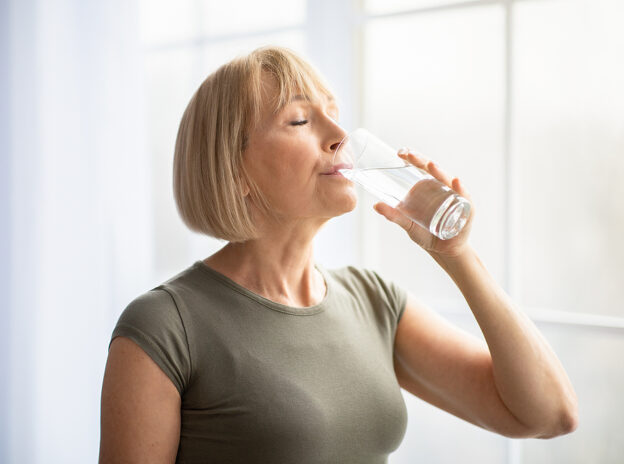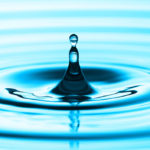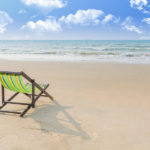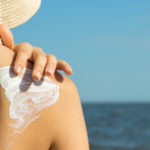By David Blyweiss, M.D., Advanced Natural Wellness
January 24, 2022
Back in 2018 a video made the rounds on social media. It featured Odell Beckham, Jr., who was a wide-receiver for the New York Giants at the time. And he was having a horrible problem with muscle cramps, something that can be avoided with something as simple as drinking water.
But what did he have to say about it?
“I really don’t like water,” he said. “I’m trying, I really just don’t like it, when you get that stomach feeling, it’s all slushy. I’m trying to stay hydrated but sometimes I just gotta get an IV.”
Are you kidding me? You have the choice of drinking a few glasses of water and avoid muscle cramping altogether – or you can suffer through the cramps that will affect your game play, knowing you’ll need an IV – and you choose the latter?
MD Exposes the Hidden Danger to Your Eyes

When your eyesight starts to fail, it's a real problem. Suddenly you can't go to the grocery store... you can't get to the doctor if you have an emergency... you can't meet your friends for dinner…
Your "regular" doctor doesn't have time to keep up with the latest research. And the same goes for eye doctors. They go to school to learn how to fit you for glasses and contacts, but have no way of preventing the damage and loss of eyesight that threatens your freedom and independence.
Let me show you something that explains a LOT about how your eyes work.
In my FREE Special Report, I'll show you a HUGE, untapped resource for your eyes that safely and naturally restores clear, effortless eyesight.
Click here to get started...
The problem is, some people don’t like water. It has no flavor. It’s boring. They’d rather drink anything BUT water.
And then there are the people who just “forget” to drink it. They’re busy. They have easier access to other beverages. So on and so forth.
At last count, only about 22% of U.S. Adults were drinking the general recommendation of eight cups (64 ounces) or more of water each day. And this is well below the Institute of Medicine’s (IOM) official recommendation of 13 cups a day for men, and 9 cups a day for women.
There aren’t that many things that will not be improved with keeping yourself hydrated whether it’s a headache, whether you’re hungry, if you’re in pain… or just feel out of it. There are so many things that will get better just by drinking the water you need.
When You Need Water the Most
Are You Suffering From...
- Love handles and a pot belly
- Romance that isn't what it used to
- Forgetfulness and inattention
- Low (or no) strength and endurance
- A sex drive that's shifted into neutral...or worse
If so...you may have Mature Male Burnout. Click here to discover more about this unique condition and what you can do about it.
While you should consistently be hydrating your body, there are certain times when it is critical.
These include:
- When you have brain-fog. Even mild dehydration can decrease cognitive function, affect your concentration, reduce level of alertness and impair short-term memory.
- When you have a headache. Headaches, including migraines, are one of the first signs of dehydration.
- When you have a slump in energy. Dehydration is a known cause of low energy. Without enough water, your body can’t carry nutrients to the cells or carry away waste products.
- When you sweat. Sweat is basically water and salt. So the more you sweat, the more water your body loses. This can lead to dehydration. Always take along some water on hot, humid days and when you work out.
- When you’re sick. Vomiting, diarrhea and fever all deplete the fluids in your body. Drink up!
- When you have a kidney or urinary tract infection. Dehydration contributes to the formation of kidney stones and urinary tract infections. Stay well-hydrated to avoid them. But if you do get one, start slugging down the water.
- When you want to lose weight. if you replace your sugary drinks with water, it’s going to help keep your weight down. Plus, if you drink water throughout the day, it will help keep you feeling satiated.
- When traveling by plane. Airline cabins have very dry, recirculated air. And longer flights shift fluids to the lower extremities. This combination can lead to acute dehydration. Depending on the amount of time you expect to spend in the air, purchase one or two liters of water after passing security and drink about eight ounces every 30-60 minutes during the flight. Also, flying at 30,000 feet you lose about one pint of body water per hour from insensible water losses via your breath and skin.
How to Drink More Water Every Day
To start your day off right, you should have your first glass of water in the morning right after you pee. You’ve got to replace the fluids you just flushed down the toilet along with the fluids you lost overnight from breathing.
I know some people who leave a glass of water sitting on the bedstand overnight to make it easy to remember. So they drink their water warm in the morning. Other people like to get up and make a fresh glass with some lemon juice or a slice of orange in it.
The next thing to do is to make your water easily accessible. I generally have a glass of water on hand at all times, and I have a 16 ounce go-cup that I take with me whenever I leave the house.
If you’re at home and tend to forget to grab a glass of water every now and then, just prepare it in an insulated go-cup first thing in the morning and carry it around with you. Refill it whenever it gets empty. And if you’ll be out for the day, just take it along – whether you’re going to work, golfing or to get your errands done.
If you’re one of those people who “doesn’t like water,” try an all-natural water enhancer. Avoid the ones that have added fructose, artificial sweeteners and sugars. Or, if you’re fond of carbonated beverages, something like a SodaStream might work well for you.
The key is to just find ways to get more water into your body.
SOURCES:
Goodman AB, Blanck HM, Sherry B, Park S, Nebeling L, Yaroch AL. Behaviors and attitudes associated with low drinking water intake among US adults, Food Attitudes and Behaviors Survey, 2007. Prev Chronic Dis. 2013 Apr 11;10:E51.
Popkin BM, D’Anci KE, Rosenberg IH. Water, hydration, and health. Nutr Rev. 2010;68(8):439-458.
Khorsha F, Mirzababaei A, Togha M, Mirzaei T. Association of drinking water and migraine headache severity. J Clin Neurosci. 2020;77:81-84.







